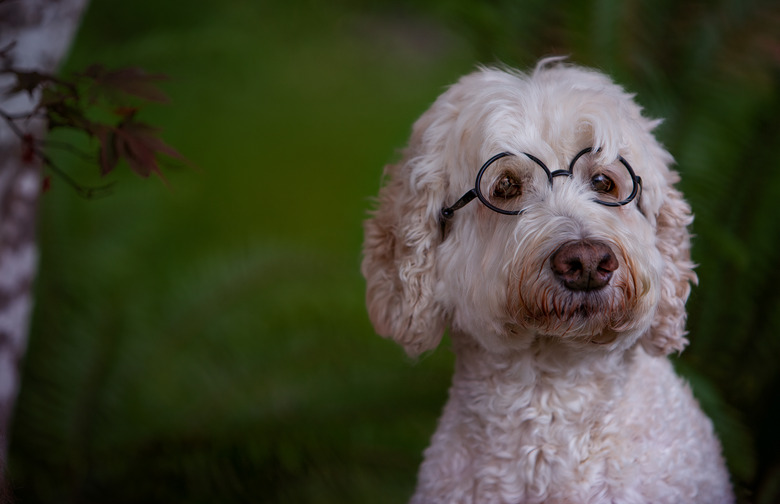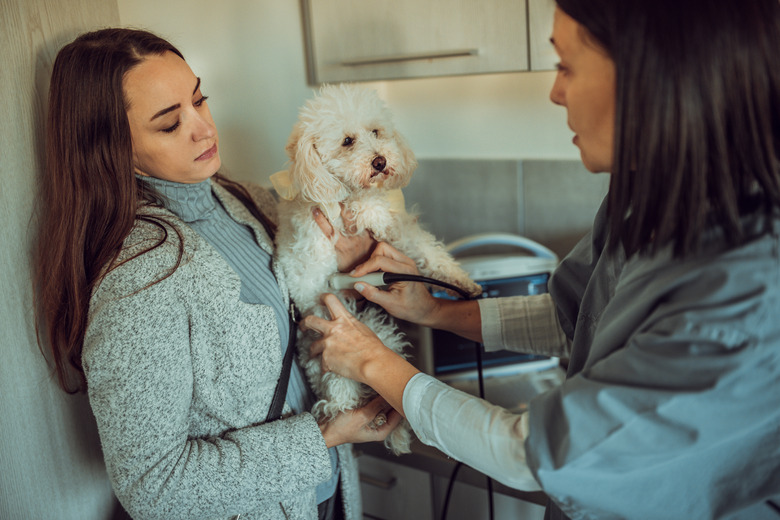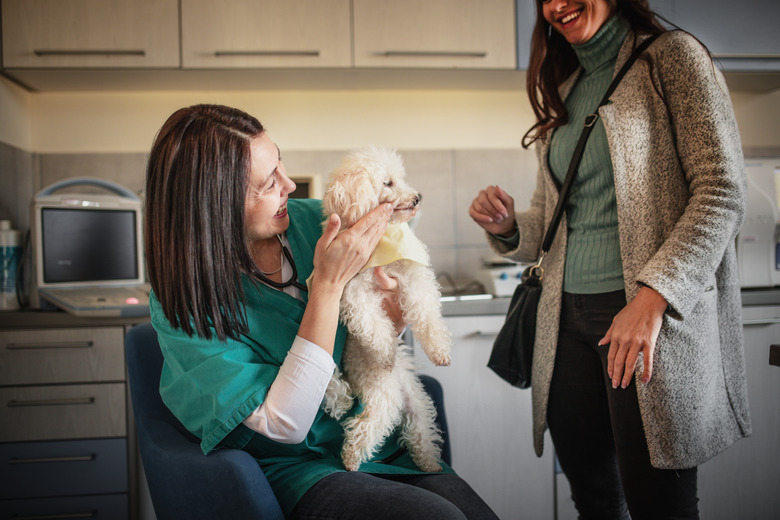Can Dogs Need Glasses?
If you're reading this right now you may be squinting because, frankly, your eyes aren't what they used to be. And then, because your dog is the most important thing to you in the world you wonder: Is it possible that my dog might need glasses too?
But before you run over to Warby Barker to get your dog a fancy monocle (so cute), we've compiled a list of information you may want to study up on.
Can a dog need glasses?
Can a dog need glasses?
Yes! There are a number of conditions that can affect a canine's eyesight, and doggy glasses, or doggles (goggles that fit dogs), may in fact protect your dog or even help him see better.
According to AKC, causes of vision impairment in dogs include:
- glaucoma
- macular degeneration
- cataract
- hypertension (high blood pressure)
- diabetes
- chronic dry eye
- tumors
- cancer
What do dog glasses look like?
What do dog glasses look like?
Dog glasses are basically like people glasses, but...they fit dogs! And would you believe that there are contact lenses for dogs, too? But since you asked, doggy glasses aren't only a good fix for vision impairment. They can also protect your canine against the elements, like sun, snow, sleet, and wind! Doggy goggles and UV sunglasses are worn by adventurous doggos who ride in motorcycles, boats, sleds, and convertibles! Doggies on the go need protection, too!
Ways to detect vision impairment in your pet
Ways to detect vision impairment in your pet
According to Christopher Pirie from the Cummings School at Tufts University, pets are good at memorizing their environment, so sometimes it can be hard for owners to detect any vision impairment in their pets. Animals who have eye difficulties rarely cry or whine to signal any pain or discomfort, but they may tend to sleep more than usual, or be less active. Be sure to take your dog to the vet if you notice him engaging in any unusual behaviors and remember to always stay up to date on your yearly check ups!.That way, you can catch any potential problems and get your pet feeling better again.
According to AKC, here are some symptoms of vision impairment in dogs to watch out for:
Symptoms of vision loss in dogs
- bumping into furniture
- trouble locating food/toys
- not making eye contact
- increase in anxiety
- reluctance to jump off of the couch
- clinginess
- aggression
How can I correct my dog's eyesight?
How can I correct my dog's eyesight?
The best person to diagnose and treat any vision impairment in your pet is your veterinarian. Along with glasses that fit dogs, your vet may prescribe canine contact lenses to correct your friend's vision. Additionally, if your dog develops a cataract, or eyelid tumor, your vet may recommend surgical repair to help your dog's vision impairment. There are many options to correct a canine's eyesight, but the first step is to consult your veterinarian for proper medical advice.
Poor eyesight in humans vs. poor eyesight in dogs
Poor eyesight in humans vs. poor eyesight in dogs
Dogs do not see as well as humans to begin with. To put a dog's eyesight in perspective, according to AKC, perfect human vision is 20/20, and the average dog's vision is 20/75. Dogs are much worse at determining differences in brightness and different shades of objects than humans and are additionally, very nearsighted. Fortunately, a dog's strong sense of smell often makes up for any vision impairment!
For obvious reasons, humans end up wearing glasses a lot more often than dogs do, both because it's easier to administer vision tests to humans, and because humans have the ability to understand what glasses are and why they might need to wear them.
Are dogs really colorblind?
Are dogs really colorblind?
You may be well aware that dogs are colorblind, but it turns out that dogs may see more colors than we thought. Dogs aren't colorblind in the sense that they just see in black and white. In fact, their color vision is more similar to humans with red-green color blindness in that they have trouble differentiating between different shades of color. According to AKC, dogs can see yellow and blue, and combinations of those colors, but bright red comes across more as a dark brown color. Red and orange are difficult for your dog to see, so if your friend seems to ignore a toy in those colors, it may not be an immediate cause for concern: she may just have trouble distinguishing it from another color in her path.
Conclusion
Conclusion
It is possible for a dog to need glasses, and dog glasses do exist, along with dog contact lenses! Whether or not your dog may need glasses, be sure to always keep a close eye on him and monitor any unusual behaviors. It's important that you check in regularly with your veterinarian so that you can keep your best buddy happy and healthy!
Always check with your veterinarian before changing your pet's diet, medication, or physical activity routines. This information is not a substitute for a vet's opinion.



